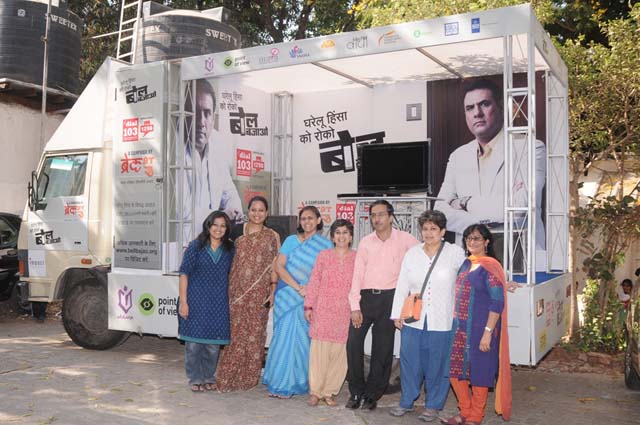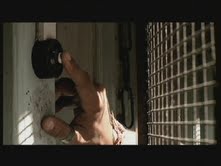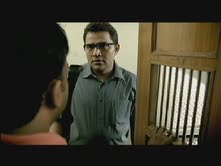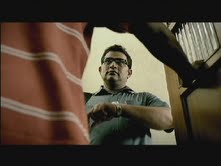They sell soap and fizzy drinks and luxury lifestyles, don’t they?
Well, advertising companies do all of that but sometimes they also sell change, create awareness and bring about a sea-change in social attitudes.
When Mallika Dutt, director of Breakthrough, the international human rights organization, adopted the innovative, game-changing strategy of ‘Bell Bajao’ to combat domestic violence in communities, she turned to the advertising firm of Ogilvy & Mather to translate that vision into film.
Two of the films bagged the Silver Lion at the Cannes Lions International Advertising Festival 2010. Ogilvy & Mather had created these films for Breakthrough pro bono – so this just goes to show no good deed goes unrewarded!
Mallika Dutt founded Breakthrough in 2000 and since then this international human rights organization has used award-winning initiatives in India and the US to address issues of violence against women, sexuality, HIV/AIDS, racial justice and immigrant rights. Here she chats about the Bell Bajao campaign and how it became a powerhouse change-maker.
Breakthrough’s Mallika Dutt & the Bell Bajao Story
1. I’m curious about the Bell Bajao campaign – how did you think of it and was there any particular event which triggered it for you?
One out of every three women faces violence behind closed doors, so whether it’s ringing a door bell to stop a crime or speaking out, we want to make sure everyone – including men and boys – does their part to ensure women in your communities are living free of violence. It’s about time we all stop being silent witnesses.
2. Advertising is all about selling a product or an idea. How did you come up with the concept of Bell Bajao?
As Breakthrough engaged in a creative process with Ogilvy & Mather, we discussed many concepts related to issues of masculinity and identifying violence. We were interested in understanding and explaining what actually happens in society. We wanted to look at the role of men in as collaborative and proactive, and provide options for action and intervention – if you hear abuse going on inside someone else’s home, ring the doorbell, stop the violence.
To-date we have formed over 1000 partnerships with organizations and institutions across sectors and reached more than 130 million people through our creative television, radio and print ads. We have engaged another 2.7 million through our traveling community vans which broadcast the PSAs in urban and rural communities and provided educational workshops.
Bell Bajao! Bus Driver Rings the Bell from Breakthrough on Vimeo.
3. Why do you think these videos appeal to people?
People love the campaign because it makes them part of the solution – and for men and boys, that’s particularly important. They can move from abuser to advocate for women’s human rights very easily with Bell Bajao’s call to action.
4. The Bell Bajao campaign has been on since 2008 – have there been different ads for it over the years?
Three initial Bell Bajao ads were introduced in August 2008, through television, radio, and print. Distributed in partnership with UNIFEM and the Ministry of Women and Child Development in India, the first ads included: “Knock, Knock”, “Got Milk?” and “Ring, Ring” which features film star and campaign ambassador Boman Irani.
Bell Bajao! (Ring Ring – English Version – Violence Against Women) from Breakthrough on Vimeo.
This first iteration of Bell Bajao ads were extraordinarily successful. We reached more than 130 million in India alone. We also inspired similar campaigns against domestic violence in Vietnam and Pakistan. The second phase of Bell Bajao ads, inspired by those who “rang the bell,” were released in April 2010.
5. How successful have these ads been in creating awareness and have they helped in intervention? Can you share some anecdotes with us?
We are constantly hearing inspiring stories of our impact through personal interactions and stories on our blog.
Christina Lobo Jha in Mumbai told us: “There is a woman in my building who goes to hell and back once a week while all the neighbors sit quietly in their flats, pretending to have heard nothing. Last week, the screaming and crying started at 8am. It stopped when her husband left for work.
Come 8pm, the husband was home again and it started again. By 1am, the screams were louder than ever. I couldn’t take it anymore and marched upstairs with my dog, Kelly, and I rang the bell! Her husband shooed my dog out and told me not to interfere, but I haven’t heard any more screams since then. I hope it stays that way. I won’t hesitate to ring the bell again … and the cops, too.”
Mandiya from Karnataka has this story: “There is a man who regularly returns home from work and begins drinking and abuses his wife. A group of children from his neighborhood participated in the video van activity as part of the Bell Bajao campaign and decided to intervene. Every evening they intervene by ringing the bell once he returns from work, and asking to watch television in his home.”

6. Tell me about the video vans – how often are these sent out and are specific areas targeted?
Breakthrough’s Video Vans have made two tours so far. In 2008, they were on the road for 150 days traveling 80,000 kilometers engaging with more than 2.7 million people. Men and boys were encouraged to address issues of domestic violence through street theater and games, as well as media and educational programs. The vans traveled through the state of Karnataka, where Breakthrough engages in intensive community mobilization work, through a local center and dedicated staff in Mangalore.
In April 2010, the Video Van again traveled through Karnataka as well as Mumbai. This spring, the Van covered 2,500 kilometers over 20 days. More than 12,000 people participated in video van activities in rural and urban areas, including media presentations, street theatre, games, and music – even performances by famous rock band, Swarathma.
7. Do you think a campaign like this could work in the inner cities or crowded areas in the US or would it be regarded as intrusion? What’s your suggestion for intervention in this country if one sees or suspects domestic violence?
We are encouraging folks to take a stand whether you are in a crowded area or a rural space. At the end of the day, abuse will only stop if we change norms and culture that makes it OK for men to hit women. Ringing the bell is a metaphor for taking action – you can call 911, if it’s someone you know, you can have a conversation with the abuser, you can encourage the victim to get help. But most importantly, you should start with yourself and make sure that you treat yourself and others with dignity and respect.
8. What’s next for the Bell Bajao campaign?
Breakthrough is going global with Bell Bajao. Building on the award-winning, internationally recognized campaign Bell Bajao (ring the bell) in India, we will be introducing the Bell Bajao Global Champions campaign.
We will continue to use popular culture and social media to feature their voices and creativity to uplift this campaign and continue our work with young men and women to change social norms and behavior related to gender-based violence.
Through Bell Bajao Global Champions, Breakthrough will invite men and women from around the globe, of all ages and from all walks of life to join the campaign and “ring out” gender-based violence. They will join us in conversation, share their own transformative stories, learn how to become mentors and advocates, and ultimately become key players in the global effort to end violence against women once and for all.



